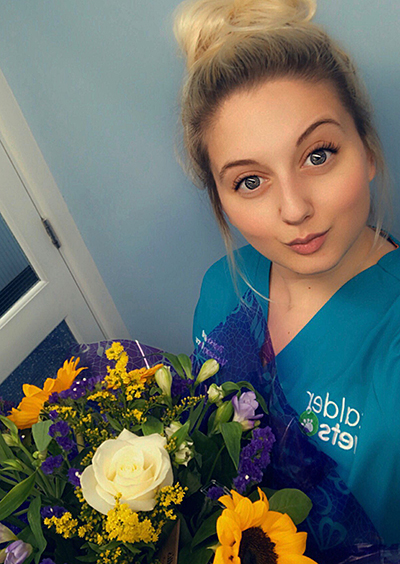
May is Veterinary Nursing Awareness Month, a whole month dedicated to raising awareness of the veterinary nursing profession and the vital role they play in animal care and treatment.
Tegan is our Registered Veterinary Nurses and has kindly taken some time to tell us about her role within a Hospital environment.
How long have you been a Vet Nurse, and what route did you follow to qualify?
I’ve been working at the Calder Vets Dewsbury Hospital since September 2015, but I didn’t start my studies until 2017. I studied for the Level 3 Diploma in Veterinary Nursing at Myerscough College in Preston and Qualified and joined the register of Veterinary Nurses in January this year, 2020.
What attracted you to a career as a Veterinary Nurse?
When anyone asked me what I wanted to be when I was “older”, I always used to say without hesitation that I wanted to be a Vet. It wasn’t until I started filling in my UCAS application for Universities that I realised becoming a Vet Nurse was even an option.
Researching the work that Vet Nurses are allowed to do, I realised that not only are they dedicated, caring and compassionate but they are also allowed to perform minor acts of Veterinary Surgery under Schedule 3 of the Veterinary Surgeons Act 1966. This was when I realised that this was the career for me.
What does your job as a Vet Nurse entail?
As a Vet Nurse, no two days are the same, and this is why I love what I do. We are the Vets eyes and ears on the ground and work behind the scenes to keep everything organised and running smoothly. We know what Vets need (and are looking for) before they even realise it themselves, as well as being phlebotomists, radiographers, lab technicians, nutritionists, anaesthetists and most importantly – cleaners. Being a Vet Nurse is rewarding, but it takes hard work and dedication. We must be versatile and able to adapt to any situation – you never know what emergency might walk through the door.
What is the most rewarding thing about being a Vet Nurse?
For me, the most rewarding thing about being a Vet Nurse is creating bonds with our patients. We all know a hospital stay can be upsetting, even for human patients, and we understand what is happening to us and why, so we can start feeling like ourselves again. I get job satisfaction nursing our inpatients back to health, getting them to eat after days of inappetence and getting those nervous patients to trust me so that their stay with us is as comfortable as can be.
What kind of attributes do you need to be a good Vet Nurse?
A good Vet Nurse must be caring, compassionate and dedicated. Our days are often fast-paced, and being able to adapt to any situation is essential. Sympathy for our patients and empathy for our clients is a must… and a strong stomach is also a massive advantage.
What advice would you give someone thinking about a career as a Vet Nurse?
My advice would be to make sure you experience life in practice for a few weeks, so you know this is the career for you. Loving animals will only get you so far – as much as we would love to cuddle puppies and kittens all day, this is only a small portion of the job. The shifts are long, and the job is rarely 9-5, we work weekends, nights, bank holidays and even Christmas! We are there for you and your pets, 365 days a year.
What are the best things about working at Calder Vets?
The best thing about working at Calder Vets is the sense of teamwork; we spend more hours together in a day than we do with our loved ones at home; therefore its essential we all get on. Each of us have different strengths and areas we are more interested in, so part of our team dynamic is playing to each other’s strength and helping one another out.
I also like the dedication Calder Vets has towards team development and education, ensuring we provide the best care we possibly can by keeping our knowledge up to date.
What would be your career highlight so far?
My career highlight would have to be finding out I’d passed my OSCEs, the practical exams at the end of Veterinary Nurse training. This enabled me to join the registered of Veterinary Nurses and to wear our green scrubs (here I am below on the day I found out I qualified).
Q9: Have you completed any additional training to support you in your role?
To maintain our registration, Vet Nurses must complete a minimum of 15 hours of CPD (continuing professional development) each year in areas we are interested in, although we often exceed this. Since qualifying, I have completed the BVNA Oral Care dental course, Feline hypertension (high blood pressure) course and the Compassion Understood Bereavement course.
What’s the next step in your career pathway?
I recently enrolled on a Medical Nursing Certificate, which I am excited to start in January 2021. I have always loved learning and every day in practice allows me to develop my knowledge and skills further. In the future, I would also like to complete a certificate in Emergency and Critical Care.
Thank you, Tegan, for sharing your story.
To find out more about the role of RVNs in veterinary practice, or if you are interested in finding out more about a career in veterinary nursing, visit the BVNA website at www.bvna.org.uk/a-career-in-veterinary-nursing/a-career-in-veterinary-nursing.


News